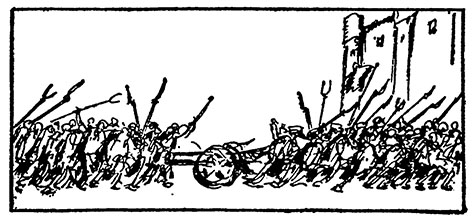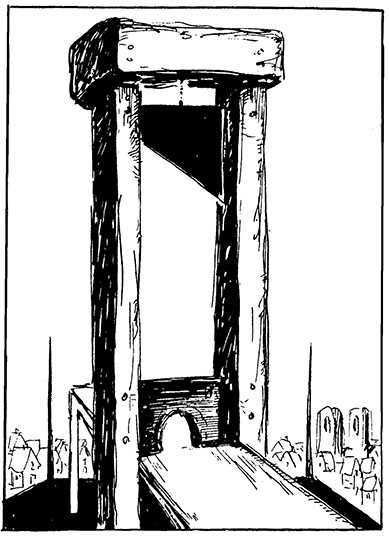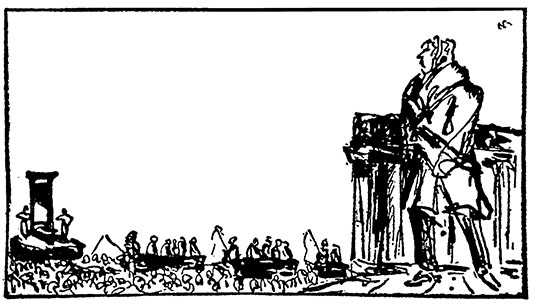Chapter 28 27. Revolutionary Intolerance
There was a edifice of honor for the great and the pain of the common people, called the Kingdom of France, which finally fell down one unforgettable evening in August, 1789.
The night was sweltering, and the anger of the people had been rising for a week, and the National Assembly was in a true fraternity revelry.It was only at this moment of passion that the privileged caste over the ancient powers and privileges which had taken them three centuries to acquire; the mass of the people proclaimed their assent to the principles of human rights, which laid the foundations for later popular self-government.
In the case of France, this meant the death of feudalism.The first-rate people are actually the most enterprising people in society. They bravely assumed the leadership, determined the fate of this ordinary country, and were given a chance to survive.The nobles were content to resign from public office and to do a little dignified clerical work in various branches of government.They are only fit for tea on Fifth Street in New York now or restaurants on Second Street.
The old France is dead.
I don't know if this is a blessing or a curse.
But it died, and with it an unseen, most brutal dominion which the Church had imposed on the anointed descendants of St. Louis since the time of Richelieu.
There is no doubt that humanity has been given another chance like never before in history.
It speaks for itself that soaring enthusiasm inspires all honest men and women.
The peaceful and prosperous age is very close, and it can even be said to have arrived.
The arbitrariness of the dictatorship and all its evils are to be cleanly and completely removed from the good earth forever.
Forward, descendants of the fatherland, the age of tyranny is gone forever!
A few words can be said about its consequences.
The curtain fell, many of the injustices in society were wiped away, and everything started anew.But when all this is over, we see the familiar "Intolerance" wearing proletarian trousers and Robespierre-style haircut, sitting side by side with the censor, spending its criminal old age .

revolution
A year ago, "intolerance" would have guillotined anyone who said those in power were simply living on God's favor, and that sometimes things went wrong.
Now, "Intolerance" drives anyone who insists that the will of the people is not always the will of God.
What a terrible joke!
And yet the joke (and everyone loved it) cost the blood of a million innocent bystanders.
Unfortunately, what I'm going to talk about is nothing new.One can find more elegant expressions expressing the same meaning in the works of classical writers.
In the spiritual life of man it has always been evident that there are, and probably always will be, two quite different types.
A few people study and think endlessly, and earnestly seek their own immortal souls. They will realize some appropriate philosophical conclusions and finally be able to get rid of ordinary people's troubles.
But most people aren't content with mental "lights," they're looking for something that will jolt their spirits, burn their tongues, cut their esophagus, and make them sit up suddenly.It doesn't matter what the "thing" is, as long as it does the above, in a straightforward way and without quantitative constraints.
Historians do not seem to understand this fact, much to the great disappointment of many.No sooner had the angry populace destroyed the old castle (an event reported with occasional enthusiasm by the local Herododi and Tassiti) than the masons were sent to transport the ruins of the old castle to the other side of the city and rebuild it. A dungeon, as vile and tyrannical as the old fortress, also for the purpose of repression and terror.
Just at this time, some self-respecting peoples finally got rid of the shackles imposed on them by "infallible men", but they accepted the command of a "infallible book".
On the same day that the old rulers fled the frontiers on horseback dressed as servants, the Liberals entered the abandoned palace, donning the royal robes they had left behind, and falling back into the mistakes and problems that forced their predecessors to flee their homes. cruelty.
It's all frustrating, but it's a real part of our story that has to be told.
There is no doubt that those directly responsible for the great upheaval in France had good intentions. The principle set out in the Declaration of Human Rights is that nothing should be interfered with the freedom of any citizen to pursue his own way in peace, according to his own views, "including religious views", so long as his views do not disturb the social order established by statutes and laws .
This does not mean, however, that all religious denominations enjoy equal power.Protestantism was henceforth allowed, and Protestants got no trouble for not worshiping in the same churches as Catholics, but Catholicism remained the "dominant" state religion.
Mirabeau had an unmistakable instinct for understanding the essence of political life, and he knew that this notorious concession was a partial solution.He tried to turn a great social change into a personal revolution, but died before his ambition was fulfilled.Many nobles and bishops, regretting their magnanimity on the evening of August 4th, resorted to the method of erecting obstacles, with fatal consequences for their royal masters.It was not until two years later, in 1791 (two full years, which was too late for any practical purpose), that all religious denominations, Protestants and Jews alike, had achieved a basis of complete equality when the equal freedom before the law.
Since then, the roles have been reversed.The representatives of the French people drew up a constitution for this promising country, requiring the clergy, whatever their beliefs, to swear allegiance to the new regime, just as the schoolteachers, post office employees, lighthouse keepers, and customs officials of their fellow countrymen, must He regards himself strictly as a public servant of the state.
Pope Pius VI opposed this.The provisions of the new constitution on the clergy directly trampled on the formal agreements signed between France and the Holy See in 1516.But Parliament has no time for petty matters like precedent or treaties.Priests either took an oath of allegiance to the Constitution, or resigned and starved to death.Some bishops and priests accepted this seemingly inevitable fate.They crossed their fingers and took the oath.But the great majority of priests are honest men who refuse to swear falsely.They had persecuted the Huguenots for many years, and now, following the example of the Huguenots, they began to say mass in deserted stables, exchange ideas in pigpens, preach behind country hedges, and arrive in the dead of night. They make secret visits to the homes of former parishioners.
In general, they were much better off than the Protestants in similar circumstances, for the order in France was too disorganized to allow even half-hearted measures to be taken against the enemies of the Constitution.As none of them seemed to want to risk the guillotine, the eminent clergy—recalcitrants, as they were generally called, who refused to take the oath—quickly ventured to demand official recognition as a "tolerable sect," and demanded the privileges which they had steadfastly refused to concede to their fellow Calvinists for the past three centuries.
Looking back on that era in 1925, when we are now in a time when there is no such risk, we cannot help but find it grim and comical.But officials did not take definitive action on their demands at the time, as parliament was quickly taken over by radical radicals.The treachery of the courts, combined with the folly of His Majesty's foreign alliances, had in less than a week caused panic from the shores of Belgium to the shores of the Mediterranean, which led to the 2nd September, 1792. A series of massacres to seven days.
From then on, the revolution was destined to degenerate into a reign of terror.The hungry people began to suspect that their leader was engaged in a great conspiracy to sell the country to the enemy. At this time, the philosophers' plan to gradually achieve results was in vain.The upheaval that followed is not surprising in history.Serious students of history are familiar with how, in a crisis of this magnitude, power can easily fall into the hands of the ruthless.But the leading actor in the play was a serious man, a model, the unmitigated embodiment of virtue, which was surprising indeed.
By the time France begins to understand the true nature of its new master, it will be like wasting an outdated warning on the gallows at the Place de la Concorde.

revolutionary tolerance
So far we have studied the revolution in terms of politics, economics, and social organization, but we cannot really explain it until historians become psychologists, or psychologists become historians. Or to understand those dark forces that, in agony, determine the fate of nations.
Some people think that it is pleasure and light that rule the world.Some people think that humans respect only one thing: brute force.A few hundred years from now, we may have a choice between the two.Yet one thing seems certain, in the laboratory of sociology, the greatest experiment of all, the French Revolution, was the sanctification of violence.
Those who tried to build a more human world through reason either died or were put to death by those whom they intended to honor.With the disappearance of Voltaire, Diderot, Turgot, Condorcet, the ignorant advocates of a new perfectionism became the legitimate masters of the destiny of nations, and they made this noble mission obsolete. It's a mess.
In the first period of their reign, victory was in the hands of religious enemies who, for some reason, hated the symbols of Christianity.They had suffered in silence in the old days of priestly dictatorship, and they were outraged at the sight of the black robes worn by the priests, and the smell of incense turned their faces pale and aroused a rage they had long forgotten.Still others believe that mathematics and chemistry can be used to argue against the existence of God himself.Together they set out to destroy the Church and its works.It was a hopeless affair, a futile task at best, but it was a feature of revolutionary psychology, where the normal became abnormal, the impossible became an everyday occurrence.So a legal document abolished the old calendar of Christ, abolished Halloween, abolished Christmas and Easter, abolished the week and month, and re-divided the year into ten-day periods, with a pagan day of rest every ten days.Then came another statement abolishing the worship of God, leaving the world without a backbone.
But not for long.
In spite of all the explanations and justifications that went on in the empty Jacobin Club, such a vain proposition was unpopular, and most people could not stand it for a fortnight.The old God cannot meet people's requirements, so why not follow the example of Moses and Muhammad and create a new God that meets the requirements of the times?
And so appeared the Goddess of Reason!
Her exact identity was only found out later.At that time, a beautiful actress, wearing the appropriate ancient Greek costumes, fully met the requirements of the people.This lady was found among the former King's ballet dancers, and on a suitable occasion she was sent with great ceremony to the high altar of Notre-Dame, long abandoned by the adherents of the old faith.
As for the Virgin, she has stood on the altar for many centuries, looking tenderly on the wounded with a gaze of complete understanding and tolerance.Now she, too, is gone, hidden hastily by loving hands before being sent to the lime kiln to be turned into mortar.Her place was taken by a statue of the Statue of Liberty.This is the proud work of an amateur sculptor, sculpted casually with white plaster.But that's not all, Notre Dame has seen other inventions.In the middle of the choir there are four columns and a roof, which symbolize the "Sanctuary of Philosophy", which becomes the seat of the new dancing god on important national days.When this poor girl does not preside over the ceremony and accept the worship of followers, the Temple of Philosophy lights up the "torch of truth", intending to use this fire to illuminate the civilization of the world until the last moment.
But "the final hour" is less than six months away.

Robespierre
On the morning of May 7, 1794, the people of France were officially informed that God had been re-established, and the immortality of the soul was once again recognized as a belief.On June 8, the new God (hastily fashioned out of old materials left by the late Jean-Jacques Rousseau) was officially unveiled to the long-awaited faithful.
Robespierre, dressed in a new blue waistcoat, delivered a speech of welcome.He attained the highest position of his life, from an obscure law deacon in a third-rate city to a prelate of the French Revolution.What's more, a poor deranged nun, Catherine Theotter, is hailed by millions as the true Mother of God, because she has just announced the coming of the Savior and revealed the name of the Savior, which is Mark Similian Robespierre.This Maximilian, wearing a strange uniform of his own design, made a haughty speech, assuring God that the little world he presided over would be perfect from now on.
Just to be sure, two days later he passed another law, which stated that anyone suspected of treason and heresy (the two were once again regarded as one, as in the days of the Inquisition) was deprived of All means of self-defense.The measure worked so well that in the next six weeks more than fourteen hundred people lost their heads under the sloping knives of the guillotine.
The rest is well known.
Robespierre saw himself as the perfect embodiment of what he considered good, a quality-minded zealot, and therefore could not have acknowledged the right of other less than perfect beings to live on the same planet as him.In time, his hatred of crime expanded to such an extent that France was brought to the brink of extinction.
Finally, fearing for their lives, the enemies of virtue strike back.After a short and desperate struggle, this fearsomely righteous believer was destroyed.
From this point on, the strength of the French Revolution quickly waned.The constitution adopted by the French people at that time recognized the existence of different denominations and gave them equal rights and privileges. At least the official republic no longer took care of religious matters.Those who wish to form churches, congregational churches, and unions may do so as they please, but they must support their priests and priests while acknowledging the supremacy of the state and the complete freedom of individual choice.
Since then, Catholics and Protestants in France have coexisted peacefully.
It is true that the Catholic Church has never admitted its failure.It continues to denigrate the principle of the separation of church and state (see Decree of Pope Pius IX on December 8, 1864), and supports those parties who try to subvert the republic system and restore the monarchy or empire, in order to regain power again .But these battles were generally fought in the living rooms of ministers' wives or in lodges where retired generals and an ambitious mother-in-law hunted rabbits.
They make excellent material for interesting reading, but this only proves that they were wasting their time.

revolution

revolutionary tolerance

Robespierre
